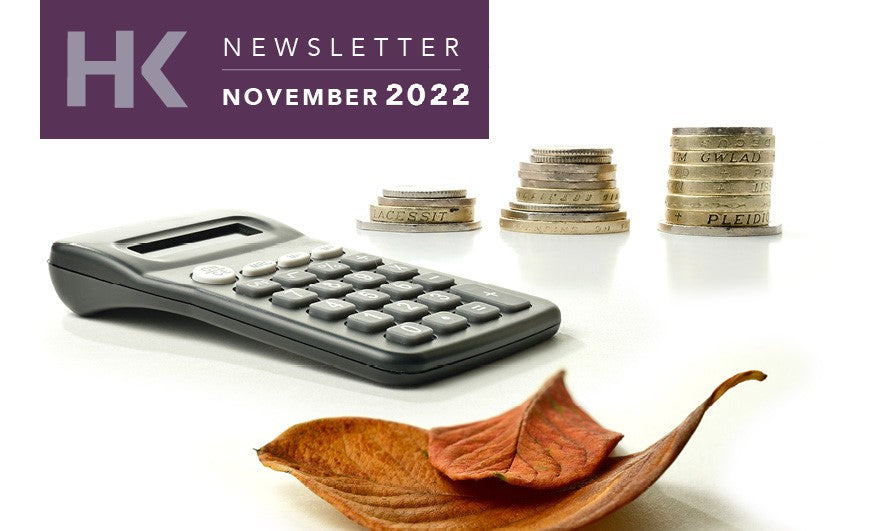
CHANGE, REPLACE, SUBSTITUTE!
Well, we opened last month’s newsletter with the not so “mini” Budget, which, other than a few points, has been totally torn up and resulted in a new Prime Minister.
Rishi Sunak’s appointment as Prime Minister will see a completely different perspective on the UK’s tax policy to his predecessor. Jeremy Hunt continues as Chancellor having been appointed by Liz Trust to replace Kwasi Kwarteng, and immediately “tore” up the mini-Budget, signalling the direction of travel and reversing tax cuts. We will get the full picture at the Autumn Statement on 17 November.
The press/social media noise is very loud in advance of the Autumn Statement, following the new Government stating that tax increases, as well as spending cuts, are needed. The new Government is highly likely go further on tax increases, having reversed the mini-Budget tax cuts. The Treasury stating nothing is off the table and commentors are speculating on increases in dividend income tax rates and capital gains tax rates, together with the loss of some tax reliefs - possibly the £2,000 annual dividend allowance.
‘Stealth’ moves are expected, including extending the freeze to personal tax thresholds until April 2028, from 2026, which may also give a signal to the international markets that the UK is committed to balancing its books over the long-term.
We don’t expect any 'giveaways', for example abolishing the high-income child benefit charge or removing the tapered personal allowance when someone's income reaches £100,000 - the tone now is very different, and the tact from a Sunak Government is likely to be focused on increasing tax receipts and cutting spending, in order to reduce the debt cost.
Look out for Harbour Key’s Budget summary following the speech on 17 November.
CAN THE GOVERNMENT'S TAX RELIEF INVESTMENT SCHEMES HELP YOUR BUSINESS?

Following on with our theme of providing our clients with advice and support in these testing times, this month we look at the Government’s tax relief investment schemes, Enterprise Investment Scheme ("EIS") and Seed Enterprise Investment Scheme (“SEIS”). In fact one of the changes announced in the mini-Budget that was not reversed was the changes to SEIS, increasing the amount that companies can raise using SEIS to £250,000 (previously £150,000) and increasing the gross asset limit to £350,000 (previously £250,000).
Take a look at article on Tax Relief Investment Schemes.
Previous articles to support your business in these testing times:
- Employers Helping Employees - STOP AND THINK!
- Can your pension fund help your business
- Cost Cutting for all Businesses & Individuals
- Meeting the Workforce Challenge (or at least a contribution)
- Successfully applying for Business Grants
RESEARCH & DEVELOPMENT TAX CREDIT

One tax relief which we may see changed in the Autumn Statement, is research & development tax credits (“R&D”). R&D is a government incentive designed to reward UK companies for investing in innovation, by enhancing qualifying expenditure by 130% for small and medium sized businesses. The relief was not popular with the now Prime Minister, who as Chancellor in his last Budget requested a review of the relief, as in his view the cost to Government could be deployed in a better way to encourage growth.
Since the Chancellor’s review, the tax relief has encountered a number of difficulties, as we have reported with claims being suspended, while HMRC investigated suspected fraudulent claims, as reported in our newsletters over the summer. The most recent update in our September newsletter.
Issues have continued with the tax relief:
- Last month HMRC arrested a gang making fraudulent claims worth millions. The arrests were part of a wider investigation into suspected fraudulent claims with eight people being arrested, including a tax agent. The individuals are suspected to have conspired to submit over 100 fraudulent claims, totalling over £16m, and laundering the proceeds.
- A Times investigation into the relief highlighted concerns that the relief was being brought into disrepute by “aggressive” advisers who encourage questionable claims, highlight allegations of advisers boasting that HMRC “almost never checks” claims and that they can represent “free money” for companies. The Times report also highlighted HMRC’s oversight of the scheme “has been so questionable” that it has been unable to sign off its accounts for the past three years because of the level of uncertainty over losses for fraud and claims that should not have been approved.
- The relief is receiving Parliamentary attention, having been debated in the House of Lords, with a crossbench peer and former cabinet minister, stating “this is a major financial scandal (referring to the increase in payouts), while the economy has been basically stagnant is completely implausible. What we have is a system which is basically, help yourself and…… the Inland Revenue ticks the claim through.”
Is it the end of R&D?
MORE HMRC NUDGE LETTERS!
HMRC have advised professional bodies that they will be launching a new campaign of nudge letters in November to tackle non-compliance linked to offshore companies owning UK property. Having reviewed data, including from the Land Registry, HMRC have identified non-resident corporate owners of UK property that may not have met certain UK tax obligations. Depending on the circumstances based on the information obtained, HMRC may issue one of two letters.
- One letter will be issued to non-resident companies that own UK property and may need to disclose income received as a non-resident corporate landlord or a liability to the Annual Tax on Enveloped Dwellings (ATED). Under the Transfer of Assets Abroad legislation, UK-resident individuals who have any interest in the income or capital of a non-resident landlord, whether directly or indirectly, may have an income charge, for example where a UK tax resident who has not personally transferred assets but benefits from a transfer made by somebody else (e.g., occupation of property) may be within the charge to income tax.
- The second letter will be issued to non-resident companies that appear to have made a disposal of UK residential property between 6 April 2015 and 5 April 2019 without filing a Non-Resident Capital Gains Tax (NRCGT) return.
Should you receive one of these letters, please do not ignore and get in contact with us.
MISCELLANEOUS
- Change to SEIS & EIS Advance Assurance Process – Further to this month article re Government investment tax relief schemes, HMRC have announced a new system for founders to obtain Advanced Assurance under EIS or SEIS. What has been named, the online G-Form service has launched, enabling applications using the new G-Form, including all necessary supporting documents online. It is no longer necessary to email applications or any attachments using the old form (although this is still available). Please note the i-form and email service remains in place for the EIS and SEIS compliance statements post investment, however these forms will be updated in the coming months with the new online G-Form service.
- HMRC Late Payment Interest – It seems each month we report an increase in HMRC late payment interest, and this month is the same. Following the increase in the interest rate by the Bank of England. As of 22 November, late payment interest rate, increases to 5.5%. The repayment interest rate increases to 2.0%.
- New South-West Business Investment Fund– A £200 million investment fund to support the growth of small and medium-sized businesses across the Southwest of England will be launched in the first half of next year. The Southwest Investment Fund is the first in a series of new regional investment funds being launched by the British Business Bank which will deliver a £1.6 billion commitment of new funding to drive sustainable economic growth. The Southwest Investment Fund will offer a range of commercial finance options with loans from £25,000 to £2 million and equity investment up to £5 million. The new fund will cover the entire Southwest region including Bristol, Cornwall and the Isles of Scilly, Devon, Dorset, Gloucestershire, Somerset and Wiltshire. (Other regions will have their own funds).
DATES FOR YOUR DIARY
- 17 November 2022 – Autumn Statement



